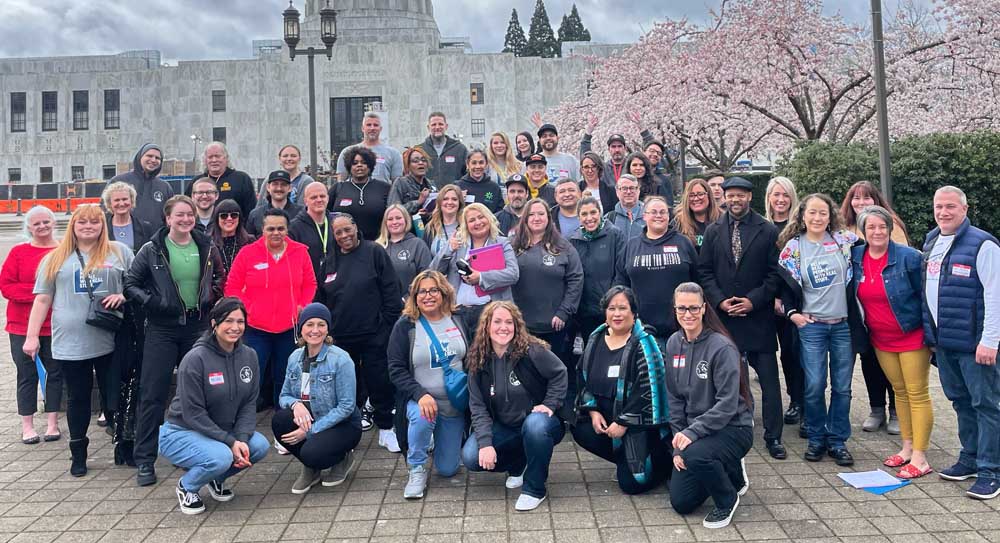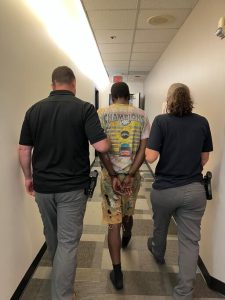OPINION: Honor National Recovery Month by building out services to save lives
Published 2:39 pm Thursday, September 26, 2024

- Measure 110 providers gather outside the state Capitol during the Health Justice Recovery Alliance lobby day.
September was National Recovery Month, presenting us with a moment in time to celebrate our loved ones in recovery, and to remind those still struggling with addiction that there is hope for a different life.
Trending
This month holds personal meaning to me; on Sept. 8 I celebrated 28 years of continuous sobriety. I’ve seen in my own life how the gift of recovery reverberated through my family, friendships and community.
The Substance Abuse and Mental Health Services Administration (SAMHSA) defines recovery as “a process of change through which individuals improve their health and wellness, live a self-directed life, and strive to reach their full potential.”
National Recovery Month is a time for us to hold space for those who never got the chance to experience the gifts of recovery.
Trending
Right now, across the country, families are grieving. Parents, spouses, children and friends are learning how to bear the unbearable — 105,303 people in the U.S. lost their lives to drug overdose in 2023; in Oregon, according to the most recent data available, 1,383 people died of a preventable overdose.
“Why wasn’t there help?” “Was there more I could have done?”
These are the questions we often ask when someone dies from an overdose. Perhaps they reached out only to be told there weren’t services for them. Or maybe there was a bed, but they had the wrong type of health insurance. In our broken system, the barriers to care can seem endless, hopeless and insurmountable.
Let’s first agree that the problem we are trying to solve is to not let anyone die of an overdose. The solutions are there, we must build out a system of care that provides services across the continuum of care in the most low-barrier way. If we want people to feel safe asking for help we must destigmatize addiction and normalize harm reduction, the same way we have normalized treatment for heart disease and diabetes.
Like any health issue, addiction care should be evidence-based, rooted in science, and met with compassion. We must never again settle for a system that uses stigma, shame, punishment and fear as the only way to access help.
On Sept. 1 Oregon reinstated criminal penalties for possession of small amounts of drugs. Decriminalization was reversed, but the services component of Measure 110 remains. Decriminalization removed barriers to care, reduced the harms of criminalization, and reduced disparities. Under recriminalization, we know from more than 50 years of data that this approach will increase disparities, and that law enforcement will arrest Oregonians of color at higher rates.
People of color are already statistically more likely to face incarceration and harsher sentencing due to targeted policing and enforcement, and you’re statistically 13 times more likely to die of a drug overdose within the first two weeks of leaving prison. This is not and cannot be the way.
We must build upon the progress addiction providers have made with Measure 110 funding. OHA reports continued increases in client engagement across nearly all Measure 110 services — 55,800 new clients sought services in a six-month period. More than 987,000 service encounters have taken place — that’s almost one million interventions individuals would have not otherwise received, from harm reduction, to detox, peer support, housing, and more.
Prior to Measure 110, Oregon consistently ranked lowest in access to addiction services while having some of the highest addiction rates in the nation. Measure 110 helped correct that course, but it’s going to take more investment to build a system of care to meet the need.
We must focus policies on programs that keep people alive — including and especially on harm reduction. Someone accessing harm reduction services is five times more likely to end up seeking out addiction services than someone not engaged in any kind of harm reduction.
This is the data we should be using, not relying on the criminal system to somehow shame people into recovery. With National Recovery Month behind us, let’s agree that even one overdose is too many, and get to work on solving this problem.







